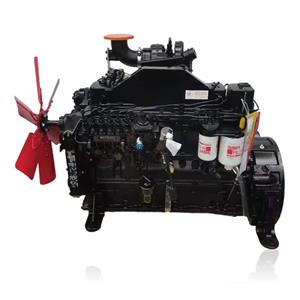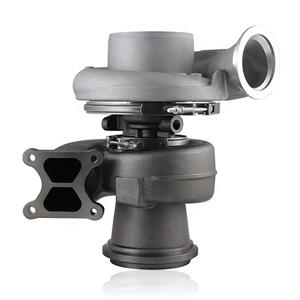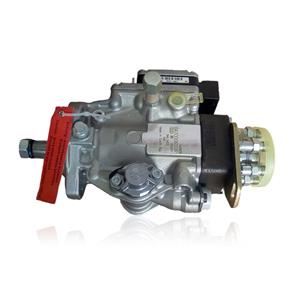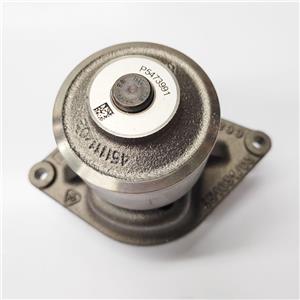What is the main reason for the large engine exhaust?
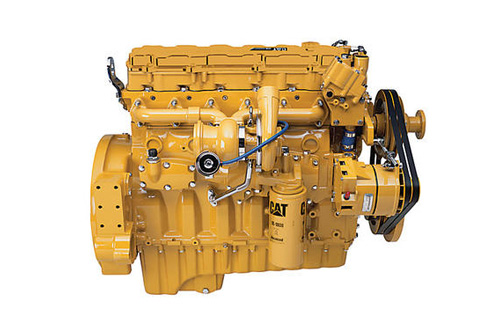
Failure analysis and diagnosis:
Excessive exhaust from the diesel engine (crankcase exhaust gas) is one of the common failures of the diesel engine. There are many reasons for the excessive exhaust pressure of the crankcase of the diesel engine, mainly as follows:
1. Severe wear of the piston ring or cylinder liner: If the piston ring or cylinder liner is severely worn, the seal between the piston and the cylinder liner is not tight, and a large amount of compressed gas will pass through the ring and the cylinder liner during the compression and expansion of the diesel engine. The small gap between them enters the crankcase, which causes the crankcase exhaust pressure to increase.
Accompanying phenomenon: Exhaust under the respirator is severe, the diesel engine is underpowered, and blue smoke may also be emitted.
2. Piston ring aligned: Although the piston rings are not worn, if the ring openings are all aligned, a large amount of high-pressure gas will enter the crankcase during compression and expansion, resulting in increased crankcase exhaust pressure.
Accompanying phenomenon: Exhaust emissions from diesel engines are severe, oil consumption increases, and exhaust gas may emit blue smoke.
3. Adhesion or fracture of the piston ring: Adhesion, fracture or loss of elasticity of the piston ring will cause the cylinder to be tightly sealed, and the combustion gas will enter the crankcase, which will increase the crankcase exhaust pressure.
Accompanying phenomena: The crankcase exhaust pressure is high, the diesel engine emits blue smoke, the power is insufficient, and there is abnormal noise in the cylinder.
4. Ablation of the top of the piston or wear of the cylinder: Severe ablation of the top of the piston or pulling the cylinder will cause the cylinder to lose its seal, and the pressure of the crankcase exhaust gas will increase naturally.
Accompanying phenomenon: abnormal noise from diesel engine, black smoke from exhaust, insufficient power or diesel engine cannot rotate.
5. Crankcase Breather Failure:
①Respirator film or (breather) piston is damaged. Damage to the respirator film or (respirator) piston will cause the crankcase to be out of balance with the atmosphere, and will cause an increase in exhaust emissions from the crankcase under the effect of internal and external pressure differences.
Accompanying phenomenon: increased oil consumption and severe exhaust blue smoke, but it has basically no effect on power and so on.
② Blocking of small vent holes in the balance of the respirator and the atmosphere: Blocking of small vent holes in the balance of the respirator and the atmosphere will cause the interior of the crankcase to be unable to maintain equilibrium with the atmosphere. Similarly, the internal and external pressure difference will cause the crankcase exhaust gas to increase. Big.
Accompanying phenomenon: increased oil consumption and severe exhaust blue smoke, but it has basically no effect on power and so on.
6. Too much oil refueling: Too much oil refueling will cause the crankcase exhaust gas pressure to increase. This is because the space inside the crankcase is limited, too much oil is added, and high-speed moving parts such as crank connecting rods will seriously hit the oil and cause Splashes and oil mists cause the crankcase exhaust gas pressure to increase.
Accompanying phenomenon: The crankcase exhaust pressure is high, and the oil level is too high.
7. Severe blow-by gas in the air compressor: If the piston ring of the air compressor is severely worn, it will cause the compressed oil of the compressed air and random oil to blow into the crankcase together, which will increase the crankcase exhaust pressure. When there is no problem in inspecting the piston rings, cylinder liners, and respirators of the diesel engine and the crankcase exhaust gas pressure is still high, a corresponding inspection of the air compressor is required.
Accompanying phenomenon: the crankcase exhaust gas pressure increases, the oil consumption increases, the equipment gas path system pressure is very slow and organic oil. At this time, the quality of the air compressor should be checked, the air system of the equipment should be dredged, and parts such as the air compressor (piston ring, etc.) or the air safety valve should be replaced as appropriate.
8. The main differences between piston ring or cylinder liner factors and other factors leading to high crankcase exhaust gas pressure:
① The piston ring or cylinder liner is worn, and it is the combustion gas that penetrates into the crankcase. Therefore, the crankcase exhaust has a strong smell of combustion gas, but other factors do not have this smell.
② Piston ring or cylinder liner gas blow-by can easily cause the oil to darken in a short period of time. For other factors, the oil darkening time is normal.
③ Piston ring or cylinder liner blow-by will cause diesel engine lack of power, black smoke, abnormal noise in the cylinder, etc., but other factors will not have these phenomena.

